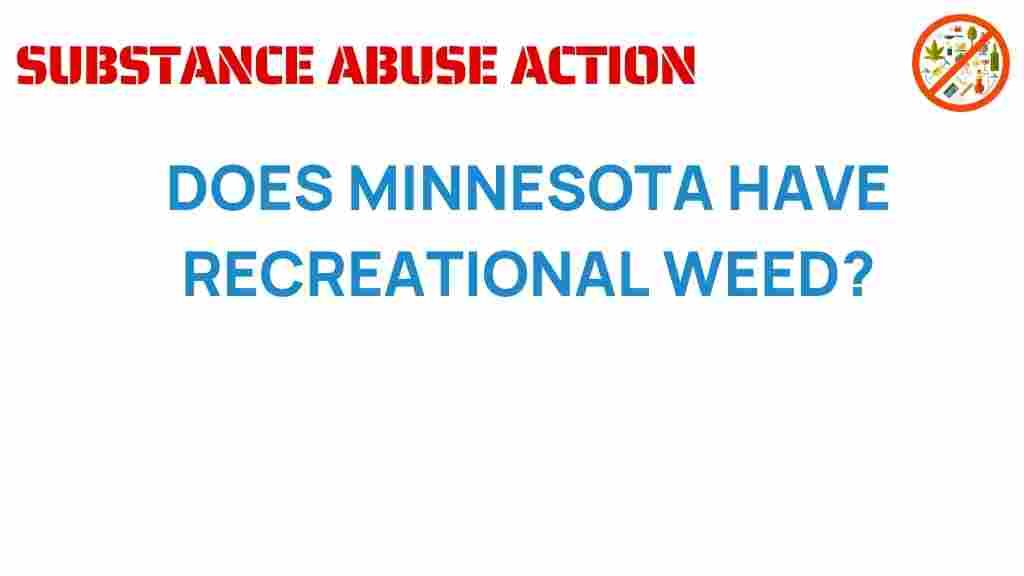Minnesota’s Recreational Weed Debate: What You Need to Know
The conversation surrounding Minnesota’s recreational weed policies has gained significant momentum in recent years. As more states across the U.S. move towards cannabis legalization, Minnesota finds itself at a crossroads of public opinion, health impacts, and economic effects. This article delves into the legal framework, state regulations, and the implications of recreational marijuana in Minnesota, offering a comprehensive overview for residents and interested parties alike.
The Current Legal Landscape of Cannabis in Minnesota
As of now, Minnesota has taken incremental steps towards cannabis legalization but has yet to fully embrace recreational weed. Medical marijuana has been legal since 2014, allowing patients with qualifying conditions to access cannabis products. However, the push for full recreational legalization has sparked heated discussions among lawmakers, activists, and the general public.
Key Components of Minnesota’s Marijuana Policy
- Medical Cannabis Program: Established to provide patients with access to medical marijuana, regulated under strict conditions.
- Decriminalization Efforts: Various cities have moved towards decriminalizing small amounts of cannabis, reducing penalties for possession.
- Legislative Proposals: Several bills have been introduced in the Minnesota legislature aimed at legalizing recreational cannabis.
Public Opinion on Recreational Weed
Public opinion is a critical factor in the cannabis legalization debate. Recent surveys indicate that a significant portion of Minnesotans support the legalization of recreational weed. According to a 2022 poll, approximately 60% of residents favor legalizing cannabis for adult use. This shift in public sentiment is influencing policymakers and could pave the way for future legislation.
Health Impacts of Legalizing Cannabis
One of the primary concerns regarding cannabis legalization is its health implications. Advocates argue that legalizing recreational weed can lead to safer consumption practices and better regulation of cannabis products.
- Potential Benefits:
- Reduction in opioid use for pain management.
- Improved mental health for some individuals.
- Health Risks:
- Increased risk of dependency for some users.
- Potential negative effects on mental health, particularly among young adults.
The Economic Effects of Cannabis Legalization
The economic impact of recreational weed is another critical aspect of the debate. Legalizing cannabis could lead to a substantial boost in state revenues through taxation and job creation. Here are some key points to consider:
- Job Creation: The cannabis industry has the potential to create thousands of jobs in cultivation, retail, and distribution.
- Tax Revenue: States that have legalized recreational cannabis have seen significant tax revenue, which can be allocated to education, healthcare, and infrastructure.
- Tourism Boost: Legalization could attract tourists looking to experience Minnesota’s cannabis culture.
Legal Framework and State Regulations
If Minnesota were to legalize recreational weed, a robust legal framework would need to be established. This framework would cover various aspects, including:
- Licensing: Regulations for growers, manufacturers, and dispensaries to ensure quality and safety.
- Age Restrictions: Setting a minimum age for purchase and consumption, similar to alcohol regulations.
- Public Consumption: Defining where cannabis can be consumed and imposing penalties for violations.
Steps Towards Legalization
The path to recreational cannabis legalization in Minnesota is complex and requires careful consideration of various factors:
- Engage Stakeholders: Involving community members, healthcare professionals, and law enforcement in discussions about cannabis legalization.
- Draft Legislation: Lawmakers need to draft comprehensive bills that address key concerns and outline regulations.
- Public Hearings: Conducting hearings to gauge public opinion and gather feedback on proposed legislation.
- Vote in Legislature: Bills must be voted on and approved by both houses of the Minnesota legislature.
- Implementation: If approved, regulations will need to be established, and the legal framework put in place.
Troubleshooting Common Concerns
As discussions around recreational weed continue, it’s essential to address common concerns and misunderstandings:
- Concern: Legalization will lead to increased youth consumption.
- Response: Many states that legalized cannabis saw a decrease in teen usage due to better regulation and education.
- Concern: Cannabis use will increase driving incidents.
- Response: States have implemented strict DUI laws and public safety campaigns to address this issue.
Conclusion
The debate over Minnesota’s recreational weed policies is far from over, but it reflects a broader national trend towards cannabis legalization. As public opinion shifts and economic benefits become more apparent, the possibility of legalizing recreational cannabis in Minnesota grows stronger. Understanding the legal framework, health impacts, and economic effects is crucial for residents as they navigate this evolving landscape. For more detailed updates on Minnesota’s cannabis legislation, you can visit this resource.
Ultimately, whether Minnesota will embrace recreational weed remains to be seen. However, the ongoing discussions and potential for a more comprehensive marijuana policy signal a pivotal moment in the state’s approach to cannabis. Stay informed, engage in the conversation, and consider how these changes may impact you and your community.
This article is in the category Prevention and created by SubstanceAbuseAction Team
